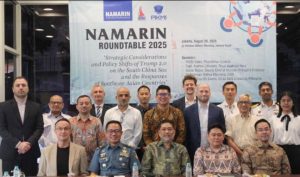Jakarta – Intensive regional cooperation is essential to mitigate the escalating conflict in the South China Sea, which has been intensifying in recent years.
It was mentioned that such intensive cooperation was discussed during the “Namarin Roundtable 2025: Strategic Considerations and Policy Shifts of Trump 2.0 on the South China Sea and the Responses of Southeast Asian Countries” in Jakarta on August 26, 2025.
Speakers at the discussion, which included attachés and representatives from friendly nations, were the Head of the Maritime Assessment Center of the Naval Command and Staff College, Rear Admiral Salim; the Deputy Chief of Mission of the Philippine Embassy, Gonar Musor; a representative from CSIS, Muhammad Waffaa Kharisma; and a representative from De La Salle University Philippines, Renato Cruz de Castro.
Rear Admiral Salim stated that the South China Sea issue is highly significant due to the substantial economic value of the region. “Global trade routes amount to trillions of US dollars, and energy resources are abundant. Territorial disputes, freedom of navigation, and China’s increasing assertiveness are the main issues today,” he said.
According to him, cooperation among countries in the region is crucial, and investment and trade collaborations must be mutually beneficial, even though they also involve risks, which must be carefully considered by each relevant country.
Meanwhile, CSIS researcher Muhammad Waffaa Kharisma noted that amid the ongoing escalation, the United States is expanding its allied operations in Southeast Asia, such as in the Philippines.
“For Southeast Asia, the main challenge is not only navigating US-China competition but ensuring that its interests are not sacrificed in pursuit of deals with Trump or China,” Waffaa stated, adding that the South China Sea is entering a more militarized and transactional era.
“Trump’s second term will test ASEAN’s capacity to remain more than just a spectator in the game played by larger powers,” he further emphasized.
Meanwhile, Renato Cruz de Castro from De La Salle University Philippines stated that the Philippines, together with the US, is striving to counter China’s ambitions in the South China Sea. This was reflected in US Defense Secretary Pete Hegseth’s visit to the Philippines in late March 2025.
Both countries (the Philippines and the US) reaffirmed their commitment to the Mutual Defense Treaty (MDT). The defense pact was signed by Manila and Washington in 1951.
Following the meeting, the Philippines and the US agreed to undertake initiatives aimed at enhancing security deterrence in the South China Sea, including the deployment of advanced and strategic US capabilities, such as the Navy-Marine Expeditionary Ship Interdiction System (NMESIS), to the Philippines.
Finally, it was conveyed that the “Namarin Roundtable 2025” serves as a smart solution to help foster peace in the South China Sea.
It is hoped that tensions in the region will not be exaggerated, as they could lead to greater escalation. The parties involved are aware of the need to avoid open conflict, as it would be detrimental to all in the region.
South China Sea
The South China Sea is a major marginal sea of the western Pacific Ocean, historically serving as a critical maritime trade route connecting East Asia with the Indian Ocean and beyond. Its strategic location and rich resources have made it a focal point of territorial disputes, primarily involving China, Vietnam, the Philippines, Malaysia, and Brunei.
Naval Command and Staff College
The Naval Command and Staff College is a premier military education institution that trains mid-career naval officers for command and staff duties. Its history is rooted in the professionalization of naval forces, with many countries establishing their own colleges in the 20th century to develop strategic thinking and leadership skills among officers.
Philippine Embassy
The Philippine Embassy serves as the official diplomatic mission of the Republic of the Philippines in a host country, facilitating bilateral relations, providing consular services, and assisting overseas Filipinos. The history of the Philippine Foreign Service began after the country gained independence from the United States in 1946, leading to the establishment of its embassies worldwide to represent its sovereign interests. These embassies are vital institutions for promoting national interests and safeguarding the welfare of Filipino citizens abroad.
CSIS
CSIS (Canadian Security Intelligence Service) is Canada’s primary national intelligence agency, established in 1984 to replace the discredited RCMP Security Service. Its mandate is to collect and analyze intelligence on threats to national security, including terrorism, espionage, and cyber threats, while operating under strict legal and parliamentary oversight.
De La Salle University Philippines
De La Salle University (DLSU) is a private, Catholic research university in Manila, Philippines, established in 1911 by the Brothers of the Christian Schools. It was founded as De La Salle College to provide a human and Christian education to the youth, and it has since grown into one of the country’s leading educational institutions. The university is renowned for its academic excellence, particularly in business, engineering, and the sciences, and has a rich history of contributing to national development.
ASEAN
ASEAN (Association of Southeast Asian Nations) is a regional intergovernmental organization established on 8 August 1967 in Bangkok, Thailand, by its five founding members. It was created to promote political and economic cooperation, as well as regional stability, among its members. Today, it has grown to include ten member states and is a major economic bloc and a central platform for dialogue in the Asia-Pacific region.
Mutual Defense Treaty
The Mutual Defense Treaty is a security pact signed in 1951 between the United States and the Philippines, formalizing a military alliance in the aftermath of World War II. It commits both nations to support each other in the event of an armed attack by an external party in the Pacific region. The treaty remains a cornerstone of the bilateral relationship and has been the foundation for subsequent defense agreements.
Navy-Marine Expeditionary Ship Interdiction System
The Navy-Marine Expeditionary Ship Interdiction System (NMESIS) is a modern, unmanned coastal defense weapon system. It was developed to provide the U.S. Navy and Marine Corps with a long-range, over-the-horizon anti-ship capability. The system is a key component of the Marine Corps’ Force Design 2030 initiative to modernize for distributed maritime operations.






